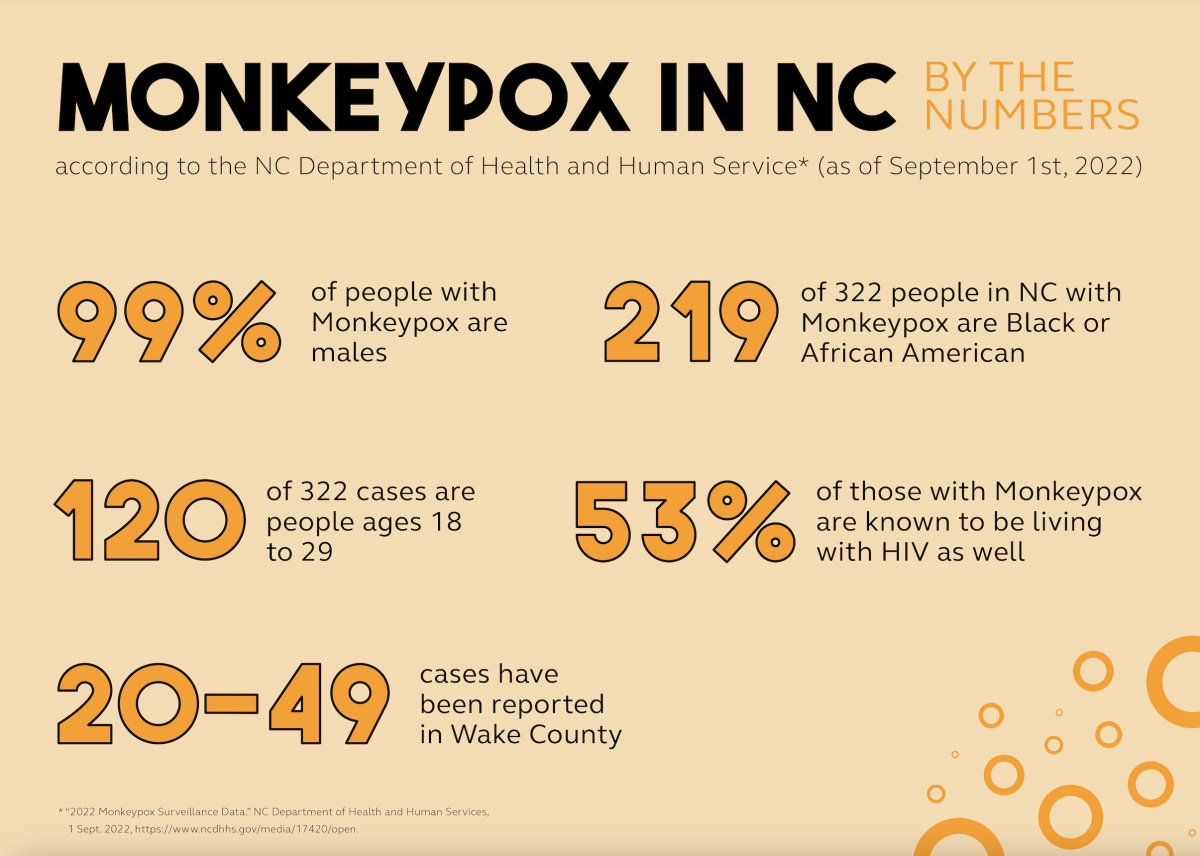As with COVID-19, misinformation and misconceptions surrounding monkeypox have become common. Technician has reached out to NC State experts to siphon through some of these misconceptions and provide a clearer picture of what is actually going on with the virus.
The monkeypox virus (MPV) is in the family of pox viruses. While it is closely related to smallpox, it is not the same. According to Dr. Julie Swann, professor and department head of the Fitts Industrial and Systems Engineering with experience in health systems and infectious disease studies, MPV has been around for decades but in limited locations and spread at much slower rates than what has been seen in the past months.
“[MPV] is less easy to transmit or catch than the virus that causes COVID-19 or influenza or cold, those kinds of things,” Swann said. “It can be spread by eating wild animals or working with wild animals that have the virus and historically, it was spread in that way in Africa. It can also be spread in close contact and intimate settings. This could include sexual activities, but it can also include some others: sharing bedsheets or towels, for example, close skin-to-skin contact, even if there’s no sexual activity and possibly by prolonged kissing.”
Dr. Julie Casani, the director and medical director of Campus Health said MPV can also be spread from surfaces, such as couches, chairs and other non-porous surfaces. While it can spread through these surfaces, it is a highly unlikely method of transmission with 0.2% of cases being contracted this way, according to the World Health Organization.
“We know that you can be close to somebody for five minutes and if they have COVID, especially with some of the omicron variants, you can get it right away,” Casani said. “Monkeypox — not true. You have to be with that person for a period of time, it has to be very close, so me sitting in a room with somebody who has monkeypox, I’m very unlikely to get it.”
Although most cases of MPV are contracted through sexual settings, it is not considered a sexually transmitted disease. Swann said MPV would be better classified as an intimately transmitted disease.
“Mothers and children are intimate, there is even a case of a dog now that has the disease and slept in the bed with the owners,” Swann said. “There was no sexual activity at all, they just used the same bedding. It is not an STD or an STI, although it can be transmitted in those kinds of environments.”
Following WHO reports which said over 95% of MPV cases were reported among men who have sex with men, rumors began to spread of MPV being a virus only homosexual people could contract.
“This is not a gay virus,” Swann said. “There is no such thing. Viruses don’t know gender or sexuality, they know surfaces and air. There was likely a set of amplifying events where the population of men who have sex with men were attending some of these amplifying events in Europe earlier in the year and there likely had been some levels of the virus already circulating.”
Swann said sometimes viruses hit specific communities first before spreading to others.
“For another example, there are currently active polio cases in New York and some of the first cases have been found in the Orthodox Jewish population,” Swann said. “It’s not that the virus cares who that person is, but they have a lower rate of vaccination against polio so they are at greater risk than some populations are.”
Casani said it’s difficult to provide information to at-risk groups without people taking the information out of context.
“That layer of communication, scientists sometimes have difficulty communicating because you communicate the science and you miss the human interpretation of that science,” Casani said. “It’s always the hard part because you want to identify that group at risk, it’s really important that we get vaccines out to men who have sex with men; that is our drive because that’s the population that’s really at risk. Someone who has an agenda is going to twist that and put it in a weird light. I’m old enough to have grown up during the HIV epidemic; I was in medical school when that broke, and I watched the same thing happen.”
Swann said MPV has proven to be less fatal in the United States than what was reported in Africa.
“It can be fatal, but even outside of the risk of death, it can be very painful for two to four weeks that might require a student, staff or faculty to be out of class or out of work,” Swann said. “It is a real danger, but it is not yet to the point of where everyone is at immediate risk, but the more we let the virus spread, then the greater chance the virus has to mutate.”
In order to protect oneself from MPV, Swann and Casani recommend taking the same precautions that one would take with any other infectious disease.
“Ask your partners and take all of those precautions, the same thing that you would do really for any illness,” Casani said.
Casani also said students who suspect themselves of having MPV are recommended to make an appointment with Campus Health and look into being vaccinated for MPV if they are in an at-risk population. According to Casani, Campus Health has vaccines available and has already vaccinated over 30 students and staff members.













